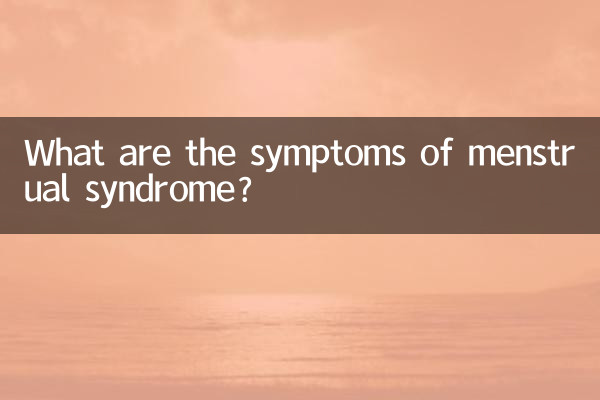What are the symptoms of menstrual syndrome?
Menstrual syndrome, also known as premenstrual syndrome (PMS), is a series of physical and psychological symptoms that occur in women before their menstrual cycle. These symptoms usually begin 1-2 weeks before menstruation and gradually disappear after menstruation begins. The following is a detailed introduction to the symptoms, causes and relief methods of menstrual syndrome.
1. Common symptoms of menstrual syndrome

Symptoms of menstrual syndrome are diverse and may involve physical, emotional, and behavioral changes. The following is a common classification of symptoms:
| Symptom type | Specific performance |
|---|---|
| physical symptoms | Breast tenderness, bloating, headache, joint or muscle pain, fatigue, changes in appetite (especially cravings for sweet or salty foods) |
| emotional symptoms | Mood swings, irritability, anxiety, depression, emotional sensitivity, difficulty concentrating |
| behavioral symptoms | Sleep disturbance (insomnia or somnolence), social avoidance, decreased work productivity |
2. Causes of menstrual syndrome
The specific cause of menstrual syndrome is not fully understood, but it may be related to the following factors:
| Possible reasons | Description |
|---|---|
| Hormone changes | Fluctuations in estrogen and progesterone levels during the menstrual cycle may affect brain chemicals such as serotonin, causing mood and physical symptoms. |
| nutritional deficiencies | Lack of magnesium, calcium, vitamin B6 and other nutrients may be related to PMS symptoms. |
| Stress and lifestyle habits | Symptoms may be aggravated by chronic stress, lack of exercise, or poor eating habits. |
3. How to relieve menstrual syndrome
While menstrual syndrome cannot be completely avoided, symptoms can be relieved by:
| Mitigation methods | Specific measures |
|---|---|
| diet modification | Reduce the intake of salt, sugar and caffeine, and increase foods rich in calcium and magnesium (such as green leafy vegetables, nuts). |
| regular exercise | Moderate-intensity exercise (such as yoga, brisk walking) 3-5 times a week can help relieve emotional and physical discomfort. |
| psychological adjustment | Reduce stress by meditating, breathing deeply, or talking to a friend. |
| drug treatment | Painkillers, antidepressants, or hormone therapy may be used under the guidance of a doctor. |
4. When Do You Need Medical Treatment?
If the symptoms of menstrual syndrome seriously affect your daily life, or if the following conditions occur, it is recommended to seek medical treatment in time:
1. Symptoms last for a long time or gradually worsen.
2. Severe mood swings, even suicidal thoughts.
3. Accompanied by other abnormal symptoms, such as severe headache or vision changes.
5. Summary
Menstrual syndrome is a common physiological phenomenon among many women, and its symptoms are diverse and vary from person to person. Most symptoms can be alleviated by adjusting your lifestyle, diet, and mindset. If symptoms are severe, seek medical help promptly. I hope this article helps you better understand and manage menstrual syndrome.

check the details

check the details